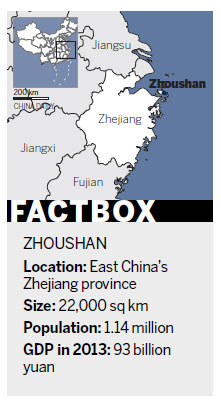The city also plans to generate power through a garbage combustion electricity generation project.
Located on Tuanjishan island in Dinghai district, about 64 kilometers across the sea from the Shenjiamen fishing port of the main island of Zhoushan, the project aims to convert 600 metric tons of garbage into power.

City officials say the project will help standardize urban household garbage facilities, save land resources, improve livelihood and facilitate sustainable development. It will also alleviate the fiscal burden of the local government and improve Zhoushan's ecological system.
"All the garbage from the city will be shipped to the plant to generate power," says Zhu Zikuan, manager of the power plant.
The project has also helped transform Tuanjishan, which used to be a landfill before 2008, says Zhang Lian, a conservancy worker on the island.
Song Min-ho, an adviser at Yangfan Group Co Ltd, a shipbuilding company, says Zhoushan has become his second home. With a gentle ocean breeze and ample seafood resources, life in Zhoushan is not much different from that in Seoul, Song says. But working in the shipyards at Yangfan Group has been quite a different experience.
"I am here to reform," says Song, adding that his mission is to help the shipbuilder become a world-class enterprise.
Song, a veteran of the shipbuilding industry, is well known for his value engineering system, a management technique that seeks to improve the value of goods or products and services by using an examination of functions. He is one of several experts that the city has managed to rope in under its various talent attraction programs.
Yangfan Group, formerly known as Zhoushan Shipyard, was established in 1952 and specializes in shipbuilding and marine outfitting manufacturing. Spread more than 2.25 million sq m along a 5,239 meter coastline, the group has made a mark as a shipbuilder and marine products manufacturer.
|
 |
 |
| The 10 most expensive cities to rent office space |
